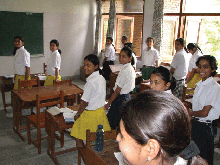The Central Board of Secondary Education (CBSE) — the largest pan-India school examination board — is considering a proposal to rank its affiliated schools on the basis of their students’ performance in mathematics and science. The rationale of the move, according to CBSE chairman Ashok Ganguly, is to help schools “brand” themselves better and compete more effectively interna-tionally. Under the proposed system of ranking, each school will present 20 of its best students from classes III, IV and VIII for a special test. Their scores in the test will serve as the criterion for ranking schools.
The proposal has sparked off a debate among teachers and parents of some of the 9,581 schools affiliated with CBSE worldwide. The Indo-Asian News Service has reported a debate in the United Arab Emirates, which has 50 CBSE-affiliated schools.
 For the most part, the debate centres on whether only two subjects should be included in the ranking test, and whether it is fair to rank schools which differ vastly in the quality of infrastructure, the background of their pupils, and their access to learning tools. “There is every reason why this debate should be encouraged, and why it ought to be greatly extended and deepened,” says Janaki Rajan, professor in the department of education at Jamia Millia Islamia University, Delhi, who has had long years of experience working with state education boards. “In my view, the proposal is dangerously misguided. It will encourage the worst forms of elitism, strengthen the growing obsession with ‘objective’ tests, and deflect from comprehension, knowledge and understanding which are at the core of education.”
For the most part, the debate centres on whether only two subjects should be included in the ranking test, and whether it is fair to rank schools which differ vastly in the quality of infrastructure, the background of their pupils, and their access to learning tools. “There is every reason why this debate should be encouraged, and why it ought to be greatly extended and deepened,” says Janaki Rajan, professor in the department of education at Jamia Millia Islamia University, Delhi, who has had long years of experience working with state education boards. “In my view, the proposal is dangerously misguided. It will encourage the worst forms of elitism, strengthen the growing obsession with ‘objective’ tests, and deflect from comprehension, knowledge and understanding which are at the core of education.”
According to Rajan, the ranking proposal seems geared to help pupils (or rather their parents) decide which schools to choose in preparation for entry into science and engineering colleges or professional courses abroad. It is also heavily biased against the humanities and social sciences, she argues.
Even this bias pales into insignificance when the reality of objective testing and the proliferating phenomenon of ‘teaching to test’ rather than ‘teaching to educate’ is taken into account. Surveys indicate that an overwhelming majority of students enrolled in CBSE-affiliated and other elite schools also attend coaching classes or take private tuition. Most follow ‘guides’ and kunjis as shortcuts to serious learning from textbooks, which involves a struggle to understand the subject rather than to mug up answers and regurgitate them. Such career-conscious or career-obsessed students are coached in the techniques of anticipating what kind of questions might be asked, and in managing the time available to maximise their score.
Many educationists also charge CBSE with deviating or departing from its original mandate, which was never to act as a central agency designing curricula or holding examinations, but to assist state-level education boards with the latest developments in pedagogy and examination methods with a view to improving the reach and quality of education. They emphasise that the CBSE-affiliated school system accounts for less than 3 percent of all pupils in India who attend more than 1.2 million schools. It largely affiliates private schools, although it also includes a limited number of government-run secondaries. And yet, it sets the agenda, including the curriculum and syllabus, for a majority of school boards simply because of its upstream linkage to professional courses through CBSE-set entrance examinations.
They allege a nexus between the CBSE, elite schools, designers and setters of examination papers, and authors of ‘guide books’, which caters to a minuscule proportion of school students looking for professional careers on the strength of their parents’ ability to spend large sums by way of coaching class fees, in addition to extortionate monthly school fees that run into several multiples of India’s average annual per capita income.
Perceptive educationists fear that the CBSE’s proposed ranking system will further aggravate maths phobia or even aversion to PCM (physics, chemistry and mathematics) which is widely prevalent among Indian students, driving them to utter despair, and often to suicide.
Praful Bidwai (Delhi)